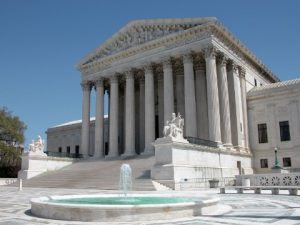 Comedian-turned-Hollywood-mogul Byron Allen is bringing his contract dispute with Comcast Corp. to the Supreme Court next week. To hear Allen tell it, Comcast is trying to turn back the civil-rights clock and make it harder for minorities to redress racial discrimination. But that’s a distortion of the case. Comcast is simply asking the Supreme Court to rule—in line with the vast majority of courts that have addressed the question before the justices—that proving racial discrimination in contracting requires proving that one has actually suffered an injury. The actual-injury requirement allows courts to differentiate between meritorious claims and those (such as Allen’s) filed simply to force a defendant to settle in order to avoid unwanted publicity.
Comedian-turned-Hollywood-mogul Byron Allen is bringing his contract dispute with Comcast Corp. to the Supreme Court next week. To hear Allen tell it, Comcast is trying to turn back the civil-rights clock and make it harder for minorities to redress racial discrimination. But that’s a distortion of the case. Comcast is simply asking the Supreme Court to rule—in line with the vast majority of courts that have addressed the question before the justices—that proving racial discrimination in contracting requires proving that one has actually suffered an injury. The actual-injury requirement allows courts to differentiate between meritorious claims and those (such as Allen’s) filed simply to force a defendant to settle in order to avoid unwanted publicity.
Allen’s media empire includes ESN, which operates seven cable networks that are available in a limited number of U.S. media markets. Over the past decade, Comcast has declined ESN’s requests that Comcast carry the networks, citing low consumer demand for ESN’s programming. Other cable operators declined similar requests from ESN for similar reasons.
In response to the refusals to carry its programming, ESN sued Comcast as well as Charter Communications, Time Warner Cable, DirecTV, and AT&T. The suits alleged that the defendants violated the Civil Rights Act of 1866, which prohibits racial discrimination in making and enforcing contracts. Several of the defendants settled the claims by agreeing to carry ESN programming, but Comcast chose to fight—and its case is now before the Supreme Court.
There is no direct evidence of racial discrimination here. But Allen alleges that Comcast offered carriage contracts to white-owned networks that had less viewers than ESN’s networks; he asserts that racial discrimination can be inferred from that allegedly disparate treatment. Comcast denies that it treated white-owned businesses more favorably and notes that its cable offerings include many minority-owned networks. Among those offerings is the Weather Channel, which Allen himself purchased in 2018 for $300 million.
The trial court gave Allen three chances to submit a complaint that stated an adequate racial-discrimination claim. The court found each complaint insufficient and dismissed the lawsuit. It ruled that Allen failed to show that racial discrimination, not other, race-neutral reasons, motivated Comcast’s refusal to offer a carriage contract. The trial court’s ruling adopted the approach taken by every federal appeals court in analogous racial-discrimination suits; those courts held that the plaintiff must show that it would have received the desired contract “but for” the alleged discrimination.
Allen appealed, and the U.S. Court of Appeals for the Ninth Circuit reinstated his case. It ruled that under the federal law governing contract discrimination, it is enough to allege that race was “a factor” in the decision not to sign a contract, even if no contract would have been made if race had played no role. The Supreme Court last June agreed to review Allen’s case, as it often does when two or more federal appeals courts disagree about how to interpret a federal law.
The standard of proof applied by a trial court makes a difference in discrimination claims of this sort. Allen’s claim is thin at best. Nothing in his complaint suggests that Comcast considered Allen’s race when it declined to offer his networks a carriage contract. But if the Supreme Court adopts the lenient standard Allen proposes—that a plaintiff need only allege that race was “a factor” in the contracting decision—it will become extremely difficult for a defendant to win early dismissal of even the most frivolous claims. And once a plaintiff survives a motion to dismiss on the pleadings, the high cost of litigation (including the cost of responding to endless depositions and document requests) will virtually force the defendant to settle the lawsuit without regard to its merits.
That may well be what Allen is counting on. But Congress adopted the civil rights laws to eliminate racial discrimination in the making of contracts, not as a litigation tool that unhappy plaintiffs can use to browbeat others into making unwanted deals. Byron Allen should not be permitted to besmirch Comcast’s civil-rights record for the purpose of expanding his own business.
Also published by Forbes.com on WLF’s Contributor Site
